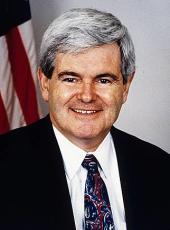
Gingrich Campaign Press Release - Newt 2012 Responds to Minnesota Judge Kevin Burke On The Establishment Clause
NEWT 2012 RESPONDS TO MINNESOTA JUDGE KEVIN BURKE, PRESIDENT OF THE AMERICAN JUDGES ASSOCIATION, ON THE ESTABLISHMENT CLAUSE
In response to Judge Burke's recent charge that Republican presidential candidate Newt Gingrich was "rewriting history" in his rejection of judicial supremacy and in his outline of various constitutional tools that the Executive and Legislative branches to check and balance the judicial branch when it exceeds its powers, I offered additional constitutional and historical sources supporting the exercise of such constitutional checks and balances.
I wish in this posting to focus on Judge Burke's understanding of the Establishment Clause, which he revealed when he was addressing Gingrich's recent criticism of a Texas federal district court judge who threatened school officials with imprisonment if they did not stop the valedictorian from using the words "prayer", "bow their heads," "amen" in her remarks at a high school graduation ceremony.
Judge Burke wrote the following:
Next to flag burning, school prayer may be among the most volatile First Amendment issues a judge faces. The Founding Fathers were clear. They envisioned a nation with no established religion but left the details of what that meant to future generations. If a judge rules on a school prayer case, expect to be attacked and don't be surprised if you are reversed.
Judge Burke is not just anyone. He is the president of the American Judges Association and a Minnesota judge for 27 years. Yet, he believes that the Founding Fathers "left the details of what [the Establishment Clause] meant to future generations."
If Judge Burke believes these details about the meaning of the Establishment Clause were left to future generations, to whom did he think they were left? Judges? Legislatures? Given that Burke then writes that judges who rule on school prayer cases shouldn't be surprised that they may be attacked for their decisions or reversed by a higher court, he must evidently believe that judges are left with working out the details of what the Establishment Clause should mean today.
Yet, there is no evidence that Judge Burke could show to support his view that the Establishment Clause was originally understood to mean a delegation to future interpreters, let alone a delegation to future judges to fill in the details. Judge Burke might consult Donald L. Drakeman's recent bookChurch, State, and Original Intent for a thorough understanding of what the Founding Fathers intended by the Establishment Clause.
But let's assume for a moment that even if the Establishment Clause were a delegation to future interpreters, why does Judge Burke think it is the judiciary that should fill out the details?
If this were the case, the burden would then be on Judge Burke to explain why the judiciary ought to have the role of interpreter, filling out the details of what the Establishment Clause means. But it will prove a difficult task for Judge Burke to be convincing in any such explanation because what constitutes a religious establishment is not something that judges have any more insight into than legislators. And if the judicial and legislative branches are equally competent to define what a religious establishment is, then there is no convincing case why we should not defer to the will of the people and their elected representatives.
Judge Burke's evident belief that judges should have (or that the Founding Fathers intentionally delegated to judges) the responsibility of defining the parameters of the Establishment Clause provides a clear example of why we have judges today who consistently exceed the judicial power in their rulings. It is also a clear example why Gingrich is right in calling for a restoration of the proper role of the judicial branch and bringing the Courts back under the Constitution.
Judges don't make laws; that is the role of legislatures. Judges interpret laws. They are not designed, nor are they equipped with special competence, to fill in "the details". Filling in "the details" is a lawmaking function and in our federal system of three separate and co-equal branches, the lawmaking function is reserved to the legislative branch.
Sir William Blackstone, the esteemed 18th century English jurist whose commentaries on the English law influenced many of our Founding Fathers, wrote about why it is so important to separate the judicial from the lawmaking function:
Were [the judicial power] joined with the legislative, the life, liberty, and property, of the subject would be in the hands of arbitrary judges, whose decisions would be then regulated only by their own opinions, and not by any fundamental principles of law.
James Madison echoed Blackstone's concern when he quoted Montesquieu in Federalist 47:
Again: ‘Were the power of judging joined with the legislative, the life and liberty of the subject would be exposed to arbitrary control, for THE JUDGE would then be THE LEGISLATOR. Were it joined to the executive power, THE JUDGE might behave with all the violence of AN OPPRESSOR.'
Thomas Jefferson's view on judges filling in details was even more straightforward:
To consider the judges as the ultimate arbiters of all constitutional questions [is] a very dangerous doctrine indeed, and one which would place us under the despotism of an oligarchy.
If Judge Burke believes that the Founding Fathers delegated the responsibility of defining the details of the Establishment Clause to future generations, the proper judicial role is to show restraint and defer to the legislative branch whose primary responsibility in a government of separated powers is to make the law.
Vince Haley
Policy Director, NEWT 2012
Newt Gingrich, Gingrich Campaign Press Release - Newt 2012 Responds to Minnesota Judge Kevin Burke On The Establishment Clause Online by Gerhard Peters and John T. Woolley, The American Presidency Project https://www.presidency.ucsb.edu/node/297861
